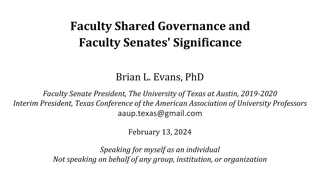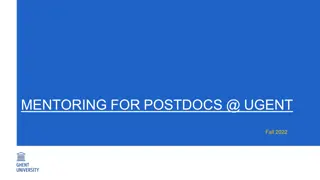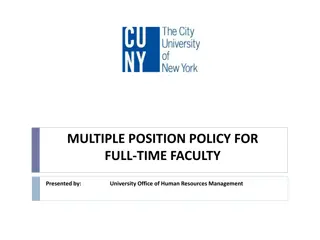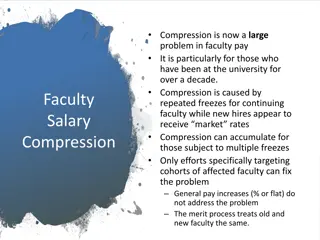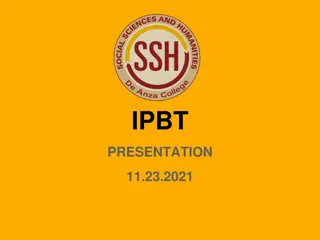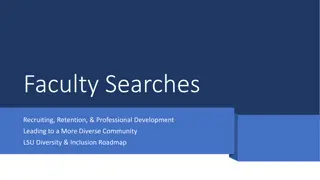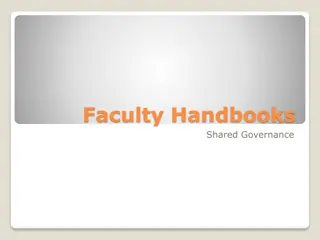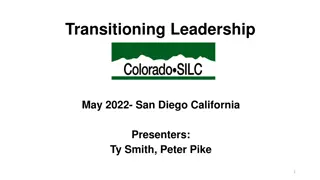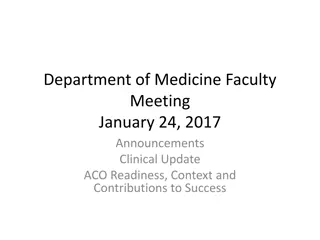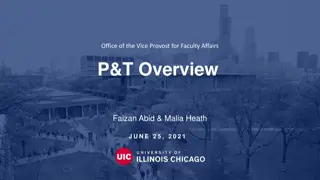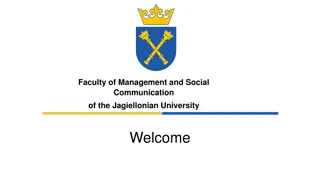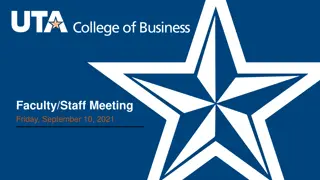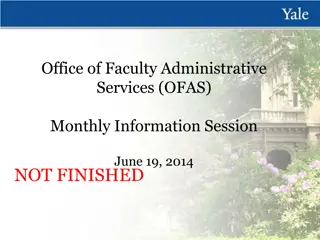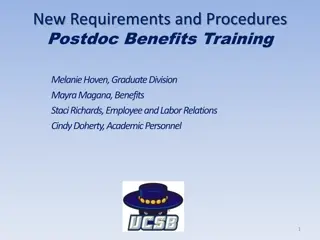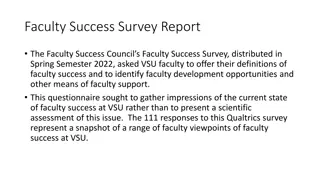Essential Tips for Transitioning Successfully from Postdoc to Faculty
Successfully transitioning from postdoc to faculty requires careful planning and attention to various aspects such as setting goals, self-care, and integrating into department life. Key principles, overlooked tasks, and practical steps like setting up your office and getting necessary approvals are crucial for a smooth transition. Remember to reflect on what sustains you, seek mentorship, and establish key relationships for a successful start in your new role.
Download Presentation

Please find below an Image/Link to download the presentation.
The content on the website is provided AS IS for your information and personal use only. It may not be sold, licensed, or shared on other websites without obtaining consent from the author.If you encounter any issues during the download, it is possible that the publisher has removed the file from their server.
You are allowed to download the files provided on this website for personal or commercial use, subject to the condition that they are used lawfully. All files are the property of their respective owners.
The content on the website is provided AS IS for your information and personal use only. It may not be sold, licensed, or shared on other websites without obtaining consent from the author.
E N D
Presentation Transcript
Transitioning Successfully From Postdoc To Faculty Sharon L. Milgram, PhD NIH Office of Intramural Training & Education milgrams@od.nih.gov
Key First Principle Can Control Cannot Control Wish to Control
Lots To Take Care Of Setting research goals Publishing your work Setting clinical goals University service Setting teaching goals Broader scientific service Setting up your lab/office Campus relationships Finding students/staff Science relationships Getting funded Personal relationships You
To Take Care of You, Reflect On: What energizes, nurtures and sustains you Your most important non-work activities and hobbies How you deal with transitions and stress How you deal with set-back, and disappointment How you calm your self-doubts and head tapes How you stay well physically, mentally, emotionally and spiritually And also -- what it means to you to be in charge and not the one doing the work
Hit the Ground Running By Taking care of your personal life Finding or reconnect with mentors Setting realistic first year goals Research goals and grant writing strategy Get set up; buy what you need Set up your office and computer Address required approvals and paperwork Make a plan for hiring staff and/or recruiting students Begin integrating into department/university life
Some Things That Are Often Over-looked: Getting started on IACUC and IRB approvals Required training courses and paperwork Advanced planning for housing animals Organizational systems for your research group Establishing relationships with core facility managers
Going Shopping? Talk to budget office in your department Learn about local purchasing rules and regulations Survey your current work environment Consider your immediate research plans Make sure you have appropriate storage in place Find vendors with new-lab specials
Relationship Management Identify key players, potential mentors, and advocates Your department or center chair/chairs Senior leadership in the department, Dean s office, university, etc Junior faculty who remember what you are going through Graduate and training grant program leadership Faculty in your field on and off campus Faculty in courses you will teach in or want to teach in Establish regular meetings with key players and supporters Attend seminars and social functions Realize you will get overwhelmed with information early-on so plan accordingly
Preparing to Teach Learn about on-campus resources Talk with other faculty about the types of students you will be teaching Collect syllabi and materials from previous lecturers Attend classes given by well-respected teachers Find well-respected teachers to observe you and provide feedback Begin compiling your teaching portfolio from the outset
Tenure Be sure you have a clear understanding of what is expected and what goes into a tenure package Ask to see examples Carefully read all university guidelines Understand your rights regarding slowing the tenure clock Talk with your chair to begin an on-going dialogue When talking with mentors and considering options talk to tenure
Time Management Find resources now if this tends to be a sticking point Be pragmatic and plan wisely it is easy to get overwhelmed with requests Engage your chair and mentors in helping you choose when to say yes and when to say no Understand the only factor Balance pragmatic decision-making with attention to your passions Ask yourself can this wait a year?, two years? Until I have tenure? Until ..?
Staffing Your Research Group Consider: What you can afford Stability of your funding How much time you have to train and mentor new employees Quality and quantity of postdocs, graduate students and undergraduates on your campus Remember training grants and other institutional support for students
Issues To Address During the Interview Experience and skills Commitment and initiative Working and learning styles Time management skills Decision making and problem-solving skills Interpersonal skills
Approaches to Effective Interviews Have a standard structure and meetings within and outside of your research group Use a standard set of questions for everyone this helps to eliminate unconscious favoritism/bias and leads to better decisions Use behavioral questions to get at issues that are important to you
Checking A Reference Best done by phone First describe the job and work environment Ask short, open-ended questions Why is s/he leaving your lab? Is s/he reliable? Why do you say that? How does s/he get along with others in the research group? Will s/he go the extra mile at crunch time? Would you rehire? Can you describe strengths and weaknesses? Probe for further information by asking for examples
Leadership Although you ve been hired for your scientific skills and research potential, your eventual success will depend heavily on your ability to guide, lead, & empower others to do their best work. Dr. Tom Cech, HHMI
Leaders Who Succeed: Create high morale, pride and spirit within their team Ensure that resources are available and remove barriers that hinder team effectiveness Adapt and develop during transitions; help employees do the same
Leadership Skills are Developed Over Time By Understanding yourself Understanding your employees and trainees Developing outstanding communication skills Collectively known as developing and using your emotional intelligence
Important Questions What is it we are trying to accomplish? What is our approach to scientific integrity and ethics? How will we maintain the highest possible standard at all times? What is our shared vision for how we should work together? How will we work together to build and maintain team morale? How will we work cooperatively to resolve conflicts and deal with issues that come up?
Why We Run Into Problems Expectation mismatch Differences in personalities, work, conflict and communication styles Discomfort relating to personal differences Competition for resources - including (your) time Insufficient time and energy put into cultivating relationships Exhaustion and burn-out (for you and/or members of your team)
Communication Within Your Team Informal interactions fostered by time in the group office, walk-by s, an open-door policy, and social interactions Technology including Slack, Teams, WhatsApp Weekly group meeting One-on-one meetings with team members Small group meetings/project meetings Strategy sessions Performance reviews and progress reports
Ways to Build & Maintain Morale Show genuine concern & interest in people; interact with them in a variety of ways Manage your stress and emotions so they don t infect the group Develop group traditions Be a real person ; develop your sense of humor Be open, honest, and self-disclosing (but not too much) Share your passion about your work Be visible and available for the team - lead by example Try not to be be aloof, arrogant, impatient, overly critical Share credit, both privately and in public ways Take responsibility for getting the team back on track when necessary
Final reflections Even with the best intentions, we can not be the best leader all of the time for all of our team. Apologies & effort go a long way, but only if we are honestly making the effort. We all have our weak spots; figure out what gets your goat and work on dealing with these issues more calmly View each failure as an opportunity to learn for the next time; find a mentoring mentor and talk it out.
Resources www.hhmi.org/labmanagement for Making the Right Moves BWF book, Staffing the Lab A variety of websites including the OITE, your IC Training Office, the NPA, Science Careers, Naturejobs Careers, The Chronicle of Higher Education, newfacultysuccess.com A large number of helpful webinars on the OITE You Tube channel


